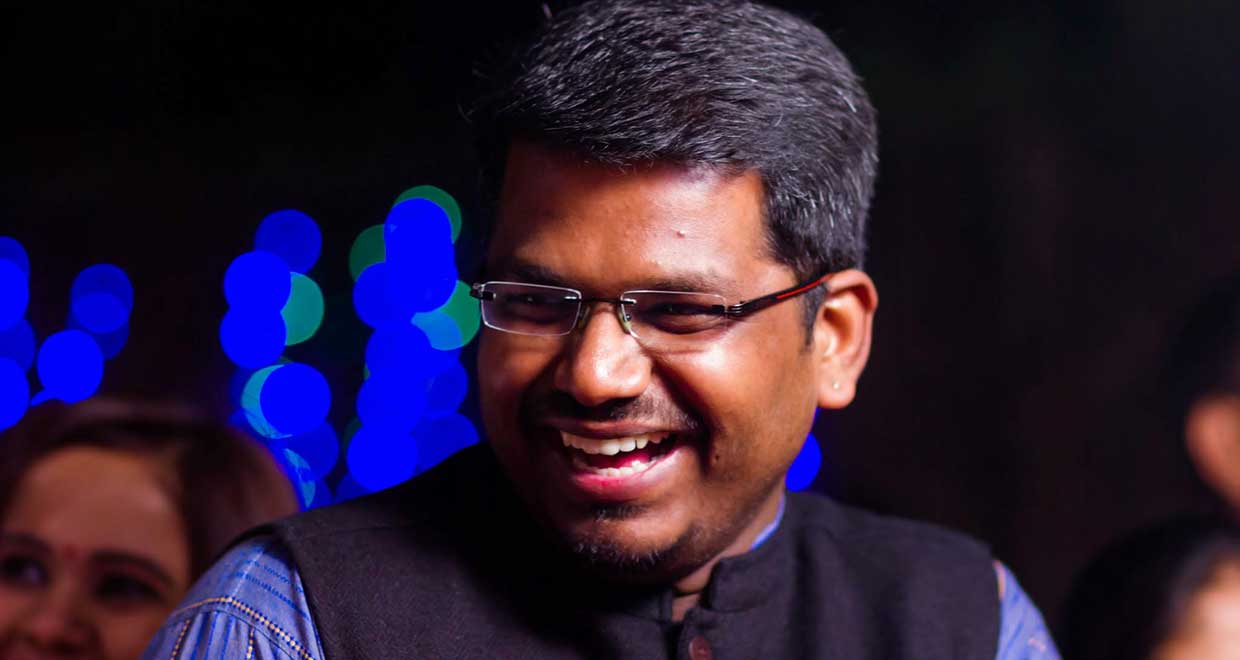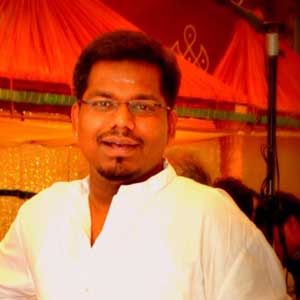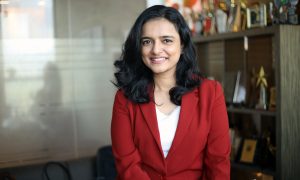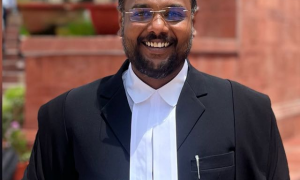J. Sai Deepak graduated from Anna University with Bachelors in Mechanical Engineering, after which he went on to pursue LL.B from IIT Kharagpur. After completion of law he joined Saikrishna & Associates as an Associate in 2009, where presently he has been promoted to an Associate Partner. He won the 2008 Legal Writing Competition of the International Association for the Advancement of Teaching and Research in Intellectual Property (ATRIP) as a student and writes for his blog “The Demanding Mistress”. He has also authored papers in various exemplary journals.
As a litigator at Saikrishna & Associates he led the team to many successes including the reading down of S.79(3)(b) of the Information Technology Act and the Intermediary Rules; representing Greenpeace India successfully in Tata Sons v. Greenpeace International & Anr.
In this interview we talk about:
- Choosing law after completing engineering at Anna University.
- Work profile at Saikrishna & Associates
- Winning the 2008 Legal Writing Competition of International Association for Advancement of Teaching and Research in Intellectual Property (ATRIP)
- Leading the team which represented the Internet and Mobile Association of India before the Supreme Court.
- Representing Indian mobile brands such as Micromax and Intex in the suits for patent infringement filed by Ericsson
Given that most of our readers belong to the legal fraternity, how would you introduce yourself to them?
I am a first generation lawyer, an engineer-turned-general litigator with core competence in Intellectual Property Law and allied areas.
Having graduated with a Bachelors in Mechanical Engineering, what motivated you to switch streams and pursue law at IIT Kharagpur?
My dream was to pursue a Masters in Aeronautical Engineering after under-graduation, but in the penultimate semester of engineering (2005), I was in IIT Kharagpur to present a paper in a technical symposium organized by its Industrial Engineering department. It was in the inaugural speech by the then Director of IIT Kgp, Shri Shishir K. Dube, that I first heard of the new LL.B. programme which was set to commence the following year, in 2006, in IIT Kgp’s Law School known as the Rajiv Gandhi School of Intellectual Property Law. I read up more on law and realized that although I took up engineering by choice, my future lay outside of it in a profession which involved understanding and dealing with people. This was perhaps because I have always had a deep interest in history, current affairs, politics and policy and I wanted to contribute in some tangible way to at least one of these areas.
These interests, coupled with my passion for debating and public speaking, made law seem like the logical choice. The choice did not seem that logical to quite a few well-wishers. In fact, the Head of the Mechanical engineering department of my college was utterly shocked and urged me to reconsider my decision. But by then the legal bug had bitten and today I am happy I took the headlong plunge into law. As for the choice of Law School, most engineers have a soft corner for the IIT brand and this may have sub-consciously influenced my decision to study at IIT Kgp, despite the fact that the LL.B. programme was nascent.
How did you get through to the LL.B programme of IIT Kharagpur?
The LL.B. programme at IIT Kgp is limited to graduates with a first degree in science or technology or medicine. For the first batch in 2006, a Statement of Purpose had to be sent along with the application form for the entrance exam, then known as the National Aptitude Test. The Test had sections on quantitative aptitude, verbal aptitude, GK and a few fundamental questions related to the law. This was followed by a Personal Interview and candidates were selected based on cumulative scores. This being the first entrance exam for a newly established Law School, I am not sure the number of applicants was remotely comparable to other post-graduate entrances in India like GATE and CAT. I got through the entrance and the other rounds based on my preparation for engineering placements. The current process of admission to the Law School, I believe, is different.
Our readers would like to know briefly about your blogpost which made you popular in the legal fraternity. Also, what made you take up blogging as a law student?
(Sai frequently writes on his blog “The Demanding Mistress”. As a law student, his blogpost on the Bajaj-TVS patent dispute was quoted and was relied upon by a Division Bench of the Madras High Court to reverse the findings of the Single Judge.)
Blogging happened to me in a very serendipitous way and largely because of dearth of opportunities to moot. Since we were students of the first batch of a fledgling Law School, there wasn’t a mooting culture back then and it was a challenge to kick-start one given the teething troubles anynew Law School typically faces. So three of us, Nikhil Ranjan, Ashwani Balayan and I,thought it would help to organize a moot court competition (“Verdict”) in our second year in our Law School (2008) and learn from the participants by observing them moot. In the process of inviting people to judge the moot, I was directed by Yogesh Pai (now a Professor at NLU,Delhi) to SpicyIP. I came across a few posts on the Bajaj-TVS patent dispute. However, no techno-legal analysis had been undertaken in those posts.Being a mechanical engineer with a tentative understanding of the law, I volunteered to write my first post on SpicyIP analysing the issues in dispute, keeping both technical and legal jargon to the minimum.In the process, I realized that blogging, and writing in general helped me unclutter the thoughts in my head and helped me articulate my views with greater clarity. Also, compared to mooting which requires a fair amount of resources on a regular basis which I couldn’t have afforded, all that blogging needed was access to the internet and the will to read up and write.Importantly, I felt blogging gave me access to a much wider audience. All these got me hooked to it.
After my graduation from Law School when I was back home preparing to leave for Delhi to join the profession, I got a call from a friend of my mine from Law School, Arindam Roy Chowdhury, who congratulated me for being cited in a decision by the Madras High Court, which I dismissed as a prank. When I opened my email account later in the day, it was flooded with congratulatory mails and messages. It turned out that my maiden blogpost had indeed been relied upon to vacate the interim injunction granted against TVS Motors. I was told (although this hasn’t been verified) that this was one of the few instances where a law student’s work had been relied upon by a Court.
In December 2010, I founded my own blog “The Demanding Mistress” where I continue to write on innovation, IP Laws, Competition Law and policy.
What role do publications play in the life of a lawyer? What, in your view, are the few most important skills that law students should strive to acquire in order to write papers/articles effectively?
(As a law student, Sai won the 2008 Legal Writing Competition of the International Association for the Advancement of Teaching and Research in Intellectual Property (ATRIP). He has also authored various papers in many reputed journals such as Max Planck Institute’s International Review of Intellectual Property Law and Competition law.)
I think clear writing is a skill that every lawyer is expected to possess and must possess. Writing really tests the degree to which one has internalized a subject and its spirit, because the clarity with which you write is reflective of your grasp of the subject. Publications in peer-reviewed journals convey the message to prospective employers and clients that you are confident of articulating your views and subjecting them to the scrutiny of a better-informed audience. It also prepares you for legal drafting when you start practicing.
I strongly believe voracious and rigorous reading is imperative for effective writing. If you write more than you read, your writing will suffer from paucity of depth and eventually you are bound to run out of topics to write on.Also, a lawyer must know how to cater to different kinds of audiences. After all, writing for a newspaper on a legal issue is not the same as writing on a specialist blog. Importantly, when a lawyer reads or writes, his/her individual personality and training as a lawyer must come to the fore.
Soon after graduation, you joined Saikrishna & Associates in 2009 and were made Associate Partner recently. How did you secure your appointment?
My entry into the Firm was not through campus placements. In fact, I sat out of the campus placements because at that time, no litigation firm approached the Law School for recruitment. Fortunately, two things happened- first, through a combination of circumstances in which the founder of SpicyIP, Shamnad Basheer, had a role to play, I was working on the Firm’s first two patent matters in my final year in Law School. So Mr. Saikrishna Rajagopal had an opportunity to assess the quality of my work and was kind enough to offer a position in the Firm’s litigation team. Second, around the time I graduated, Mr. Gopal Subramanium, who was the Solicitor General then, too had offered a position in his Chambers. Since I wanted to gain experience in trial practice and was already familiar with Mr. Saikrishna’s style of functioning, I accepted Mr. Saikrishna’s offer.
For a law student, it’s very difficult to think of becoming an Associate Partner under six years of joining the profession. What would you say helped you gain recognition?
I’d largely credit my learning to the opportunities Mr. Saikrishna has been large-hearted enough to share. He believes in teaching through empowerment, which is at the heart of the Firm’s culture. Although this means greater responsibility in the initial years, it helps you understand the ropes of the profession faster. Plus, what I am particularly thankful for is the freedom I have, to write on any issue I wish to, so long as there is no conflict of interest. This freedom matters a lot to me personally and professionally, and I am aware of the fact that this is hard to find in a law firm set up.
I would be remiss if I did not mention how fortunate I am to have had brilliant colleagues right from my first year who enjoy discussions on the law. No question or issue is dismissed as being “too academic” or trivial. It’s a very vibrant atmosphere which is what attracts interns and makes them want to be part of the Firm. Also, one of the key strengths of the Firm is the camaraderie shared by its members, which makes one look forward to go to the Court or office each day. To me, each of these factors affects individual success when you work in a law firm.
What does an Associate Partner at a Law Firm like Saikrishna and Associates do? What falls within the scope of your responsibility? Tell us about a typical work day.
At least 3-4 days in a week, I am in the High Court for the better part of the day when the litigation season is on. After I am done with my matters for the day, I usually stay back in the Chamber to prepare for the next day or to send out opinions to Clients or to meet them. The advantage of the Firm’s flexible work hours is that one’s time is productively spent in attending to work regardless of where one is, instead of wasting it in commutation. Apart from handling matters that have been assigned to me, I contribute my mite to diversifying the litigation practice of the Firm by taking up matters which may have nothing to do with IP at all. For instance, I have a personal interest in taking up criminal matters, particularly those that relate to economic offenses, before CBI Special Courts. Fortunately for me, the Firm encourages such initiatives and my efforts on this front have thus far been reasonably successful.
You have a few landmark judgments to your credit, two of which are Tata Sons v. Greenpeace and Basmati Geographical Indication case. Kindly elaborate in brief on these two cases for the benefit of our readers.
We were engaged by Greenpeace India to represent it in Tata Sons v. Greenpeace International & Anr. in 2010, which was my second year of practice. The Suit revolves around Greenpeace India’s use of the Tata trademark in its Pacman-styled game Tata v. Turtles as part of its awareness campaign on the dangers posed by the Dhamra Port in Odisha to the nesting grounds of Olive Ridley turtles. Tata Sons alleged infringement of its trademark and defamation. The case throws up fascinating issues relating to interplay between free speech and IP rights, apart from an examination of the defense of fair comment under Indian law to an allegation of defamation. In January 2011, Justice Ravindra Bhat dismissed Tata Sons’ prayer for interim injunction and upheld the defense of fair comment on the issue of defamation and Greenpeace India’s right to use the Tata trademark in exercise of its free speech. Subject to correction, I think this decision was the first of its kind in an IP context in India and has been hailed as a landmark in several advanced IP jurisdictions. The matter is set to be taken up for final arguments in the near future.
The Basmati Geographical Indication case relates to oppositions filed by the State of Madhya Pradesh and private entities from MP to the application for GI on Basmati filed by Agricultural and Processed Food Products Export Development Authority (APEDA). The oppositions were based on non-inclusion of the State of Madhya Pradesh as part of Basmati-cultivating regions in India. On December 31, 2013, the GI Registry upheld the contention of the opponents and directed the inclusion of the State of Madhya Pradesh in the GI Application on grounds that APEDA’s basis for identification of Basmati cultivating areas in India was flawed and not rooted in history and facts. The decision has been appealed against by APEDA before the Intellectual Property Appellate Board (IPAB), which is pending adjudication.
You are also representing Indian mobile brands such as Micromax and Intex in the suits for patent infringement filed by Ericsson. Could you give our readers a broad overview of the suits?
Broadly the suits relate to Ericsson’s allegation of infringement of what it claims are “Standard Essential Patents” relating to the GSM standards used in mobile telecommunication. The validity of the patents asserted and the claim of essentiality have been challenged by the defendants. Critically, the conduct of the patentee has come under scrutiny by the Competition Commission of India for prima facie abuse of dominance under Section 4 of the Competition Act, 2002. The suits and the proceeding before the CCI are sub-judice. These suits raise issues which Indian Courts and the CCI have never had the occasion to deal with in the past. In the process of handling these matters, we have discovered several facets of IP and anti-trust law and their relationship. Personally, the learning has been great.
Section 79(3)(b) of the IT Act has been read down by the Court in the Shreya Singhal decision. Could you share with our readers the significance of the decision for internet companies?
(Sai led the team which represented the Internet and Mobile Association of India before the Supreme Court in the constitutional challenge to the intermediary liability regime under Section 79(3)(b) of the Information Technology Act and the Intermediary Rules. Mr. Saikrishna Rajagopal was the counsel for the petitioners.)
Ours was the only petition which challenged the constitutional vires of Section 79(3)(b) of the IT Act. Under the original provision prior to it being read down by the Hon’ble Supreme Court, an intermediary was expected to take down content based on “actual knowledge” received from private parties of the unlawfulness of the content hosted by it. Given the vague nature of the term “actual knowledge” and the onerous obligation cast on intermediaries by the use of the term, the Apex Court read this down to mean actual knowledge of a Court order which directed take down of the content. This ensures that intermediaries do not have to act like Courts and adjudicate on the legality of content hosted on their sites.
The second limb of the challenge was to the ability of the Government to seek take down of content which was used for commission of an “unlawful act”. The term “unlawful act” went beyond the limitations imposed by Article 19(2) of the Constitution on the Government’s power to curb free speech and expression. Consequently, the scope of “unlawful act” in the context of free speech was limited to categories of prohibitions spelt out in Article 19(2).
The reading down of Section 79(3)(b)is significant owing to the integral nature of intermediaries to the internet ecosystem and the role they place as disseminators of free speech and expression of internet users. Importantly, certainty in the application of the law is important for any business, and the business of intermediaries is no exception to this requirement.
How does it feel to have landmark judgments to your credit? Do you think achievements like this can change one’s recognition drastically?
It certainly feels good to have been part of such decisions. I’d like to clarify that each of these decisions is the consequence of the collective effort of the team.
Yes, decisions such as these help increase one’s credibility as a litigator and make it relatively easier to be considered for matters involving higher stakes. That said, regardless of the outcome, what truly helps improve one’s credibility and visibility is the quality of preparation and execution in the Court since the result in beyond your control.
You have been invited by several forums in India and abroad to present your views on IP developments in India. Please share your experience in speaking on various platforms.
Based on my experience, I think, similar to writing, the nature of the audience must be taken into account when you address a forum. I have also realized that to connect effectively with a non-legal audience, it is important to keep the legalese at a minimum and highlight the broad policy implications of a legal issue. Also, as litigators, it helps to listen to multiple viewpoints from members of the industry, academics and policy analysts because these may come handy in lucidly putting forth a complex issue before the Court.
Would you say you have “specialized” in IP law? What made you interested in the same? How do you say one can gain expertise in IP Law? What does it take to be a good IP lawyer?
I’d never say that I have “specialized” in IP Law, which is why I introduced myself as an engineer-turned-general litigator with core competence in Intellectual Property Law and allied areas. For me, IP law is just another branch of commercial law with its own peculiarities like any other area of the law. The path to attain proficiency in IP law is similar to any other branch of law, which is to read as widely and deeply as possible, and to develop the ability to apply the law to the factual matrix of a given case. Critically, for anyone to acquire expertise in commercial litigation, strong foundations in property jurisprudence and common law are a must, along with command over procedural law.
How different has the three-year program been when it comes to internships? How are internships helpful for a law student?
Since ours was a three year program, there weren’t as many opportunities to intern as in a five year integrated program. Plus, I never interned in a law firm because I had very little understanding of the concept of a firm and the option didn’t sound great to me. However, I did make it a point to acquire diverse experiences by first interning at IIM Ahmedabad and National innovation Foundation, followed by GE’s John F. Welch Technology Centre in Bangalore. These internships helped me understand the theoretical and practical aspects of innovation. I do believe internships, if rightly chosen, help a student understand her/his own strengths, weaknesses and career aspirations.
What are the qualities which Saikrishna & Associates look for in a typical CV? What do you feel makes an intern stand out and is very important for him/her to do to have a chance of getting a call back or even a PPO?
At Saikrishna & Associates, the pedigree of the Law School does not matter, nor do the achievements claimed in a CV. What matters to us are initiative, conceptual clarity, the ability to write/draft crisply and the ability to marshal arguments in support of a proposition through research and logic. If a student performs well on at least some of these counts, subject to vacancy, we offer a position in the Firm. Most of our litigators have come through internships and not campus placements.
What would be your advice to students interested in litigation?
For anyone who wishes to take up litigation, I’d say patience and hard work are equally important because unlike transactional practice, litigation takes time to reward. But when it does, the thrill is just incomparable. In a nutshell, treat litigation as a marathon run and not a 100-metre dash. Also, it would help to be comfortable with general areas of practice and be good at atleast one area of practice, which is not the same as restricting oneself to a specialist area.



























